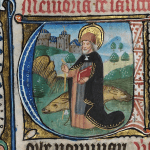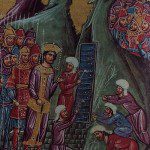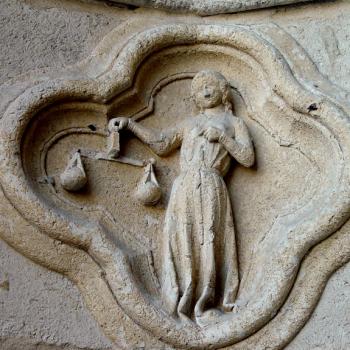
Picture by Henry Karlson
This post is a part of the Patheos Catholic Channel series, “Catholicity: Identity and Its Discontents.” Read more here.
I tend to dislike dealing with so-called identity politics because they are often the cause of great conflict and strife. They do not have to be. There are legitimate reasons for them, and good can emerge from them if we use them as a way to establish who we are so we know what we have to offer to others as a way to complement them instead of using them as a reason to denigrate or negate them for their differences.
Sadly, what usually happens with identity politics tends to be tribalism, where people establish various identities for themselves as a way to form opposition to those who are not themselves, and then to view the other as an offense against themselves instead of what they are, a needful complement to the universal brotherhood and sisterhood of humanity. Such forms of identification cuts things apart instead of seeing their underlying unity.
In other words, what we often see in history is the abuse of identity politics which uses self-identification as a form of barrier against the other instead of seeing it as a point of contact with the other by which we can form unique relationships with them. As a result, we have seen nation rising up against nation, religious creed against religious creed, political ideology against political ideology, gender against gender. The “not-we” has something wrong with them and so if they are not willing to become a part of the “we,” we feel they must become a part of the dustbin of history. We hate them for being different.
And so we tend to identify ourselves in this very fashion, determining who we are as being in conflict to those who are not like us. Instead of offering a positive promotion of what we have to offer to others, we define ourselves in relation to what we oppose in the other. National boundaries, religious and political creeds, often form as a result of saying what we are not – we are not those people over there, we are not them, we don’t want to be like them, we will not think like them because they are not us. Don’t you dare consider us to be like them because we are not. They are bad.. We are not like them. Don’t be like them, become one of us.
This shows us that instead of love, and the good which we have to offer the other (or the good they have to offer us), hate is at the core of many forms of identity politics, explaining the great conflicts which emerge once identification becomes a means of a political end. It might not be, and probably will not be, easily identified as such. We hide the hate from ourselves. And yet it emerges and takes root in our subconscious, establishing itself in the process of differentiation which occurs in the world. To be sure, it usually is not hate, but mistrust, which serves as the foundation of our dislike of the other. But this mistrust soon becomes a challenge towards us, and instead of stepping up to the challenge and allowing it to transform us and make us better, we take our stand as to where we are and find ourselves attached to our current state of being, unwilling to be changed for the better. Any who challenges us to change becomes hated, and the more they conflict with us, the more we react against them with our hate. If left unchecked, the process makes us think of the other as an existential threat, leaving us only one solution: we must seek their obliteration.
People are different, and this is a good thing, because this allows us to form relationships with each other, similar to the way the Father, Son and Holy Spirit forms relationships with each other. The Father is not the Son, and neither of them is the Spirit. For them, the distinction provides the foundation for their self-giving love to each other. They are in awe with each other. But for us, we find fear instead of that awe, and so hate takes root in the distinction found between the people of the world, allowing for greater and greater breakdowns of the positive relationships such differences should provide. Hate festers on the differences, taking apart the seams of unity; the more distinctions which exist between people serves as more reasons for them to hate each other and to tear apart our human nature. Hate makes each of us weaker, for we do not have the support we would have from the other which we otherwise would have because we have destroyed our means of communion with them. This shows the self-destructive nature of hate. Indeed, the more hate grows in us, the more it festers and eventually turns inward, creating a self-hate which ends up seeking our own nihilistic self-destruction with the world around us.
We must come to realize distinctions are not bad. Our use of them in and through our tendency to distrust and hate the other is what is bad, for it is in and through this hate, however hidden and unconscious it is, that makes sure we will never be unified, never healed from the nihilism which emerges, corrupting our interpretation of the world. For the means by which we look into the world and see distinctions in it follows through our sinful, fallen mode of existence, with our sin trying to continue its destruction of being in the world in and through us, in and through the way we establish identities for ourselves and for the others in the world.
To overcome this problem we must overcome hate. We must look at the world in a new way, where we look for the good in the other, not the bad, to see how the other works as our complement and not someone who seeks our destruction through their opposition to us. We must look to the world “with eyes unclouded from hate,” as the movie, Princess Mononoke exclaimed. That film, which is too complex to describe in a short post to do it justice, can be seen as one of the best exploration of identity politics, both in regards to the hostility which forms from them, but also in regards the good which can develop if the hate itself is eliminated and we look to the other, not as a hostile force, but as someone to love. There are demonstrations in it of how such identity politics have created strife, but also how love has a way to overcome that strife, to see the good in many and to bring them together for the common good.
https://www.youtube.com/watch?v=h4KoKTuMpj0The movie shows us different groups which are in conflict with each other because of the different interests they have which make them identify themselves in opposition to the others. Each group with its self-identification is a part of the cause of the conflicts found in the movie, and yet, as we get to know members of each group, we see greatness in each of them. There is value in establishing the various different groups with their particular identities but, sadly, the good is hard to find so long as all the groups look at each other in hate.
Things changes as a result of one of the heroes of the film, Prince Ashitaka. At the beginning of the movie, he protects his people from the mad fury a Boar Spirit (god); the creature had been wounded before it became a hostile force which had to be stopped. By putting an end to the creature, and saving his people, Ashitaka finds himself cursed by the spirit itself — its hate is transferred into him, a hate which will destroy Ashitaka if he does not find a way to remove the curse by making a journey to the forest the spirit came from and to see if the Forest Spirit there will give him the cure. To slow down the curse, he must fight against hate in himself, to see the world with eyes unclouded by hate.
Ashitaka’s journey takes him into the forest, meeting with many of the forest spirits and also a girl, Princess Mononoke, who had been reared by the Wolf Spirits. He finds out she is fighting against the people of a nearby city, Iron Town, ruled by the Lady Eboshi. During his journey, Ashitaka has to overcome hate not only in himself, but in others, helping them to see the need to work with each other, to see the good in the other despite how different the other is meant to live out their life. Ashitaka himself does this in Iron Town when he learns what good Lady Eboshi had done: the city was created to give a dignified form of life to outcasts from society (lepers and prostitutes). She sought to help others who were ordinarily hated for their own otherness, yet she did not always act right in her means of doing this, and so many of the negative things which happen in the film are a direct result of her errors. But she is not solely to blame, for the animal spirits themselves show how callous they are to each other, and the whole region ends risking self-annihilation due to the negative forms of identity politics which lie behind the conflicts in the movie.
As we watch the film, we can see the distinctions which set each group apart. We slowly see each group for the good within as well as for the errors and bad which has corrupted them and prevented them from acting with the other in proper form. We are shown how identity politics, when aimed at denigrating the other, harms all. We see the solution through the eyes of Ashitaka, where we must look beyond the eyes of hate and instead see all in the eyes of love. We must see the other for the good in them and see ourselves as to what we can offer the other: that is the only way self-identification can ed in good where we come out unscathed.
When self-identity is formed on the basis of hate, there is no solution to the conflict that emerges from that hate so long as it left to fester; all that remains is a cycle of violence, where the various sides slowly find themselves diminished until at last, they either have to find a way of peaceful resolution or perish in a self-annihilating fury. The hate must be removed, the good seen, and the good acted upon in order to establish a new order where differences are used to strengthen the whole instead of to divide it.
This is why establishing an identity of who we are in relation to others, though often done poorly so as to establish self-destructive division, does not have to be bad but can be a good, helping us recognize who we are and our role in the world. We must identify the good within us, the good which we can then promote through our identity as something we can share with the others instead of forcing them to conform to it. Scripture presents this truth for Christians in relation to the body of Christ, where we are told there will be people with different gifts, different missions, which are to work together:
For just as the body is one and has many members, and all the members of the body, though many, are one body, so it is with Christ. For by one Spirit we were all baptized into one body — Jews or Greeks, slaves or free — and all were made to drink of one Spirit. For the body does not consist of one member but of many. If the foot should say, “Because I am not a hand, I do not belong to the body,” that would not make it any less a part of the body. And if the ear should say, “Because I am not an eye, I do not belong to the body,” that would not make it any less a part of the body. If the whole body were an eye, where would be the hearing? If the whole body were an ear, where would be the sense of smell? But as it is, God arranged the organs in the body, each one of them, as he chose. If all were a single organ, where would the body be? As it is, there are many parts, yet one body. The eye cannot say to the hand, “I have no need of you,” nor again the head to the feet, “I have no need of you.” On the contrary, the parts of the body which seem to be weaker are indispensable, and those parts of the body which we think less honorable we invest with the greater honor, and our unpresentable parts are treated with greater modesty, which our more presentable parts do not require. But God has so composed the body, giving the greater honor to the inferior part, that there may be no discord in the body, but that the members may have the same care for one another. If one member suffers, all suffer together; if one member is honored, all rejoice together (1 Cor. 12:12 – 26 RSV).
We are meant to find out who we are, but we are to do it in positive relationship with others, in and through eyes of love. The positive good within us should be rendered to the other in loving service. This should be our goal. The other serves as the one who complements us and in doing so, is to receive our love, so that in and through our gift of love, they will find union with us despite the distinction which makes us different. Identity politics should serve to identity what we have to offer, not making us hate the other for what they lack; it should serve to identify the good which has been given to us to share, instead of looking at what we can find in the other to take. Identity should be formed in and through love as the foundation of its formation. Then we can look to the other with eyes of love, not hate, and lift them up instead of destroy them. And in doing so, we will find we truly lift up ourselves as well. For when one of us suffers, we all suffer, but if one is honored, we are all honored because of those bonds of love.
And so, when we speak about who we are as Catholics, we must consider it in this fashion. We should not identify ourselves so as to set ourselves up against others in the world, to create a kind of culture war which denigrates the other for whatever we find lacking in their way of life. We are to identify ourselves so as we know what we have to offer, and then to follow our Lord and go out in the world with a heart of love for the other. Our identity is meant to help us know how to serve the other instead of to be served by them by our demands. We know who we are in God, and now we are to be present in the world as the continued presence of the Body of Christ in the world, to do as he would do, finding ways to break down the barriers and divisions established by sin. If we use our identity in this way, it is a positive gain and so our Catholicism is truly catholic in spirit because it seeks union with the other in a spirit of love. On the other hand, if we see it as a way to justify ourselves as being better than the others, by our very act of such self-righteousness, we might take on the label, we might through grace belong to that label, but we have not incorporated it into our identity and so become duplicitous in our use of the label for ourselves. We want to be Catholic because we see and believe, but we have yet to learn to love which is what Jesus said we should do. If we truly loved the truth, we would more than believe it, but would act upon it and so treat others in love because truth is realized only by such love. When do so,we end up taking up our cross, deny ourselves, and follow Christ to the ends of the world, serving it out of love.
![English: Mosaic depicting Pope Paul VI and Patriarch Athenagoras I. The sacristy of the chapel Dominus Flevit in Jerusalem. Polski: Mozaika naścienna przedstawiająca spotkanie Pawła VI i patriarchy Atenagorasa z zakrystii kaplicy Dominus Flevit na Górze Oliwnej w Jerozolimie. By Abraham (Own work) [CC0], via Wikimedia Commons](https://wp-media.patheos.com/blogs/sites/637/2016/08/Mosaic_dominus_flevit_Paul_VI-300x297.jpg)
Polski: Mozaika naścienna przedstawiająca spotkanie Pawła VI i patriarchy Atenagorasa z zakrystii kaplicy Dominus Flevit na Górze Oliwnej w Jerozolimie.
By Abraham (Own work) [CC0], via Wikimedia Commons
This then is what being a Byzantine Catholic means to me. It is a way of life, a way of being a Catholic, an identity which is different from other forms of Catholicism, but a difference which does not divide me from them but unites me more with them as I understand my identity in relationship with them, reflecting as a I do the source of these distinctions being found in the plurality of persons in the One Triune God. Being a Byzantine Catholic is a way to see who I am in Christ, to see the form of life he intended for me which then I can share with others. It is not about being Byzantine Catholic because I think it is greater than other forms of Catholicism, but rather, it is because its particular character and way of being Catholic fits who I am without making me see the other as inferior for being different. Yes, its spiritual tradition appeals to me and the character God has given me more than other ways, but this does not mean the other ways are not necessary; they are, and they have much to give to the world in and through their ways of being Catholic to complement me and what I have to offer. Being Byzantine Catholic means being true to myself while never closing myself off from the other; I give to them and receive, in return, the fullness of the Catholic faith because of the union I have with them.
Stay in touch! Like A Little Bit of Nothing on Facebook:
A Little Bit of Nothing












